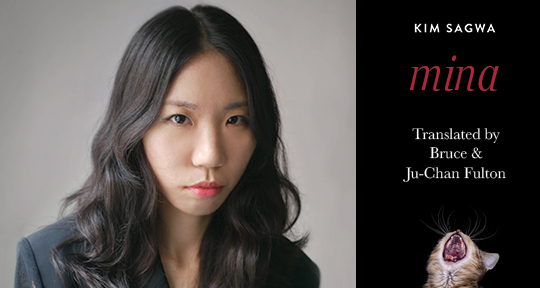Mina by Kim Sagwa, translated from the Korean by Bruce and Ju-Chan Fulton, Two Lines Press
Mina is a novel by the award-winning writer Kim Sagwa, translated from Korean by Bruce and Ju-Chan Fulton ten years after its original publication—one can tell, because the text mentions MP3 players that are by now quite obsolete. It is the very first of Kim’s novels to be made available in English. Mina is set in “P City,” which sounds like “Blood City” in Korean, and is a harrowing portrait of the horrors of metropolitan life and the Korean education system. The failures of these social orders inflict despair and desolation on adolescents, exemplified by the trio of main characters: Mina, Minho, and Crystal, all high schoolers, ultimately pushing them over to the deep end of irredeemable apathy, grief, and mental illness.
Like the vicious suggestion of its name, P City is built on an unforgiving system of discrepancy and exploitation. The city is split into two parts: a middle-class suburb propagating a “lifestyle that is selfish, ignorant, and irresponsible,” where apartment blocks are “perfectly square box-shaped cement buildings” on gridded streets, and an old part of town hosting “the lives of the losers,” overcrowded and clogged with traffic. Districts are highly gentrified, their streets flanked by franchised restaurants and chain coffee shops. This sterile status quo bleeds over to P City’s educational system, in which the virtues of submission and conformity prevail over a genuine appetite for knowledge—the marking criteria deem it more important that a student can write an essay on Rousseau using correct nouns and tenses, than to contemplate his philosophy. A commentary on South Korea’s hagwon culture, where students spend excruciatingly long hours at cram school to get better scores in examinations, P City puts students under high pressure and competition, causing the suicide of Pak Chiye, a fellow schoolmate and Mina’s childhood friend, jumping from the roof of a school building.
READ MORE…


